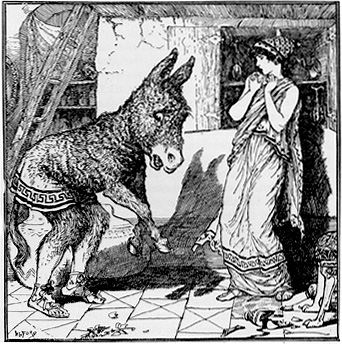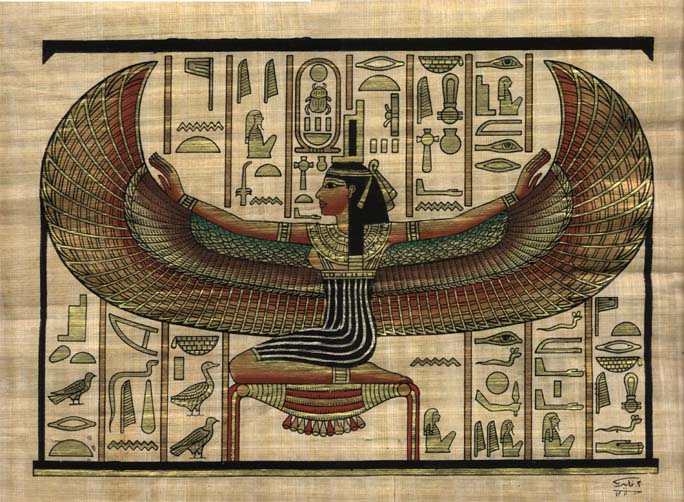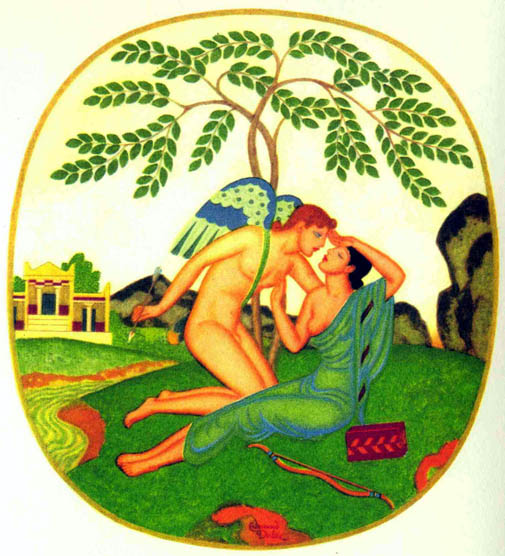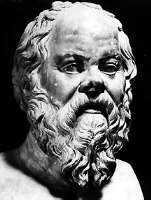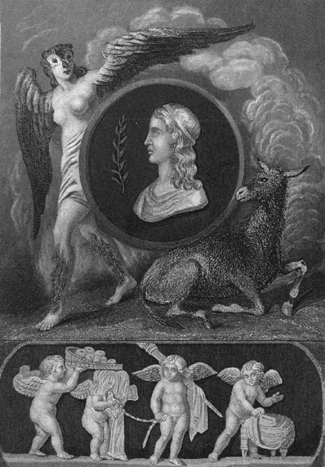
frontispiece from
Bohn's Libraries 1902 edition of The Works of Apuleius
:
a portrait of Apuleius flanked by Pamphile chaning into an owl and the 'Golden Ass' |
Apuleius -- best remembered for his humorous erotic romance alternately called The Golden Ass (Asinus Aureus) or Metamorphoses -- lived in the early part of the second century CE in Roman North Africa. He was a native of Madaura, an inland town (M'Daourouch in present-day Algeria), though he styled himself as ‘a half-and-half Numidian and Getulian’ because Madaura lay on the borders of those two kingdoms. Madaura, originally part of the kingdom of Syphax, was given to the Romans by their ally Masinissa. Madaura thus became one of Rome's North African colonies and rose to great splendour under the rule of the Roman Antonines. Apuleius’s father held the office of duumvir, the highest magisterial position in Madaura; after his father’s death Apuleius rose to duumvir himself, and inherited part of the sum of nearly two million sesterces (about £20,000 in gold) his father bequeathed to his two sons. Taking The Golden Ass to be at least partly autobiographical, scholars have also assumed Apuleius’s full name to be Lucius Apuleius (or Appuleius), that of his father to be Theseus and that of his mother, Salvia. Furthermore, making this assumption of self-reference in his romance, we also know that his mother was of a Thessalian family, descended from the illustrious Plutarch. Following this assumption of autobiographic truth in The Golden Ass, Apuleius was also ignorant of Latin until he visited Rome, where he learnt it without a teacher (though it is more likely that he was bilingual from boyhood:-- in the regional Punic, a Semitic dialect, and in Latin, the language of the colonisers of Madaura--although he claims Greek as a mother tongue); and he also managed to spend so much of his vast inheritance that he had to sell his clothes in order to defray the costs of his initiation into the mysteries of Isis and Osiris. Apuleius began his education in Carthage, at that time a renowned school of literature, adopting there a Platonic system of philosophy. He later studied in Athens and then travelled throughout Greece, Asia and Italy. He seems to have run short of money after a trip to the Olympic Games, and was forced to live by his wits for a time. Returning to Africa, he set out for Alexandria, (once famed for its libraries, now destroyed), but was taken ill at Oëa, a seaport (identified by some as modern Tripoli). |
Sicinius Pontianus, a young friend of his from the college
in Athens, invited Apuleius to become the guest of his mother, a wealthy
widow named Æmilia Pudentilla. Pudentilla was afflicted
with some nature of chronic malady (which rendered her at least in
part as an invalid), for which the doctors proscribed marriage as a
remedy. Pontianus was eager that his mother’s new husband be one of
his choosing, so he urge Apuleius to become his stepfather. Pudentilla
was not young, nor is she reputed to have been beautiful, but she was virtuous,
kind and very wealthy. Apuleius had spent most of his patrimony on his
travels and studies or gifts to teachers and friends—and he was a philosopher—so
he decided upon marrying the widow. He is thought to have had some affection
for her.
| However, before the wedding, Pontianus
had married the daughter of a man named Rufinus, who was eager for
his son-in-law to obtain as large a share as he could from Pudentilla’s
fortune and thus opposed the marriage between her and Apuleius. Rufinus
had even gained such an influence over Pontianus, that Apuleius’s old
school friend reversed his request that Apuleius do him the favour of
becoming his step-father and opposed the marriage as well. However, Pudentilla
was stubborn and persisted in her resolution to marry Apuleius, regardless
of the protests of her son and his father-in-law. Soon after they married,
Pontianus died. His uncle, Æmilianus, then joined with Rufinus
in his attempt to ruin Apuleius. They claimed that Apuleius was
a magician, that he had poisoned his friend Pontianus and gave out that
he had gained the affections of Pudentilla by dark witchcraft. They went
so far as to prosecute him on the latter charge, the law-suit being tried
in
Sabrata
in 158, before Claudius Maximus, the proconsul of Africa.
It is on this occasion that he delivered his
Defence
(also known as
Apologia
or
De Magia [A Discourse on Magic])
. Apuleius seems to have been relatively unconcerned about
the issue, and flung himself with great enthusiasm into the trial,
which allowed him fantastic opportunities for showing off his wit, rhetoric
and erudition. The main charge, that of bewitching Pudentilla, was ridiculous,
and Apuleius replied to it quite easily: ‘You are surprised that a
woman should have married again after thirteen years of widowhood; but
the real wonder is, that she should have remained unmarried so long. You
pretend that magic alone could have forced a widow of her years to marry
a young man; but that is just the sort of case in which magic would be
quite superfluous’. (Though he did confess to using a mirror, combing
his hair, bathing and cleaning his teeth!) Little is known of Apuleius’s later life, other than that he was a most voluminous writer, a great orator who frequently appeared in public; that he had charge of gladiatorial shows and hunts in his province; he became a priest of Aesculapius, the God of Medicine, as well as of Isis and Osiris; and that statues were erected in his honour in Carthage and other states. It is probably in these later days that he composed his famous The Metamorphoses, or the Golden Ass. |
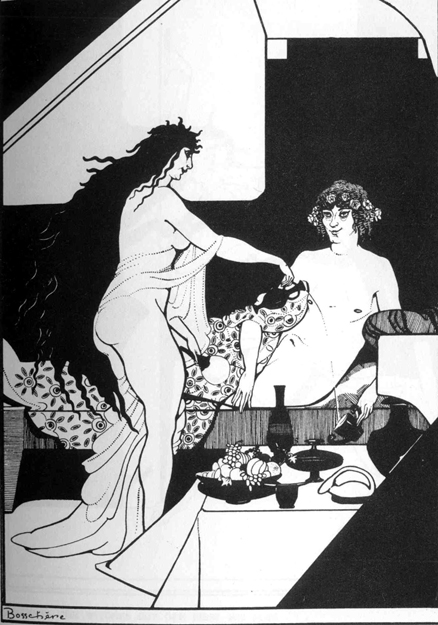
Fotis & Lucius
- illustration by Jean de
Bosschère
|
Lactantius writes that the early pagan intellectuals considered Apuleius a great thaumaturgus, and cited various miracles performed by him as equal to or greater than those of Christ. A generation later, St. Augustine wondered whether The Golden Ass told of true events or was ‘simply’ a fable.
Of all of Apuleius’s great body of work, only four texts remain whose authenticity is unquestioned: two already mentioned—his speech from the trial at Sabrata, De Magia [ A Discourse on Magic ] (also known as Apologia [The Defence ]), and his famous romance Asinus Aureus [The Golden Ass ] (or Metamorphoses) ; De deo Socratis (The God of Socrates), which was viciously attacked by St. Augustine; The Florida, supposed to be an anthology from his orations. Two others whose attribution to Apuleius are strongly questioned are De Dogma Platonis [On the Philosophy of Plato ] and De Mundo Liber [On the Universe], a translation of the Greek treatise Περì Κόσμου spuriously ascribed to Aristotle. Works which are said to have been written by Apuleius, but which are no longer extant include De arboribus (On trees); De medicinalibus (On medicines); De proverbiis (On proverbs); De republica (On the Republic); Epitome historiarum (Abridged Histories); Eroticus (Love Poem); Hermagoras , a novel; Ludicra (Games), minor poems; Phaedo, a supposed translation of Plato's dialogue on the immortality of the soul; and Quaestiones conviviales (Festal Questions).
|
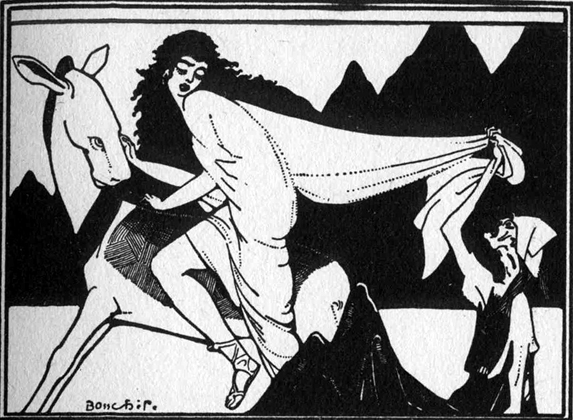
The Royal
Virgin Fleeing Captivity on Ass-Back
illustration by Jean de Bosschère
|
References
Apuleius. Apulei Platonici Madaurensis
Metamorphoseon Libri XI (Apulei Opera Quae Supersunt,
vol I). edition
& commentary by Rudulfus Helm.
Leipzig: Bibliotheca Teubneriana, 1907.
Apuleius. The Golden Ass. translation, notes, preface by Jack Lindsay. illustrated by Percival Goodman. New York: The Limited Editions Club, 1932.
Apuleius. The Golden Ass.translation, notes, preface by P.G. Walsh. Oxford: Oxford University Press, 1999 (1994).
Apuleius. The Golden Ass or Metamorphoses. translation, notes, preface by E.J. Kenney. Harmondsworth: Penguin, 1998.
Apuleius. The Golden Asse. translation, notes by William Adlington. preface by E.B. Osborn. illustrated by Jean de Bosschère. London: John Lane - The Bodley Head , 1923.
Apuleius. The Transformations of Lucius, otherwise known as The Golden Ass. translation, notes by Robert Graves. New York: Farrar, Straus & Giroux, 2000 (1950).
Apuleius. The Works of Apuleius, comprising The Metamorphoses, or Golden Ass, The God of Socrates, The Florida and His Defence, or a Discourse on
Magic (a new translation); to which are added, A Metrical Version of Cupid and Psyche and Mrs. Tighe's Psyche (a Poem in six Cantos). translation, notes,
preface by unknown. Bohn's Libraries. London: George Bell & Sons, 1902.
Leipzig: Bibliotheca Teubneriana, 1907.
Apuleius. The Golden Ass. translation, notes, preface by Jack Lindsay. illustrated by Percival Goodman. New York: The Limited Editions Club, 1932.
Apuleius. The Golden Ass.translation, notes, preface by P.G. Walsh. Oxford: Oxford University Press, 1999 (1994).
Apuleius. The Golden Ass or Metamorphoses. translation, notes, preface by E.J. Kenney. Harmondsworth: Penguin, 1998.
Apuleius. The Golden Asse. translation, notes by William Adlington. preface by E.B. Osborn. illustrated by Jean de Bosschère. London: John Lane - The Bodley Head , 1923.
Apuleius. The Transformations of Lucius, otherwise known as The Golden Ass. translation, notes by Robert Graves. New York: Farrar, Straus & Giroux, 2000 (1950).
Apuleius. The Works of Apuleius, comprising The Metamorphoses, or Golden Ass, The God of Socrates, The Florida and His Defence, or a Discourse on
Magic (a new translation); to which are added, A Metrical Version of Cupid and Psyche and Mrs. Tighe's Psyche (a Poem in six Cantos). translation, notes,
preface by unknown. Bohn's Libraries. London: George Bell & Sons, 1902.
Apuleius Bibliography / Suggested Reading
Other Apuleius Pages
Apuleius Webpage (Università di Siena)
Apuleius page (Uni. of Pennsylvania)
Apuleius, Amazigh (Berber) Philosopher & World Advocate (@ Tazzla Institute)
another Apuleius page
Related Resources
Very Useful Page of Latin Links @ Louisiana Technical Uni.
The Petronian Society Ancient Novel Page [@ Montclair State Uni. (New Jersey)]
Apuleius Webpage (Università di Siena)
Apuleius page (Uni. of Pennsylvania)
Apuleius, Amazigh (Berber) Philosopher & World Advocate (@ Tazzla Institute)
another Apuleius page
Related Resources
Very Useful Page of Latin Links @ Louisiana Technical Uni.
The Petronian Society Ancient Novel Page [@ Montclair State Uni. (New Jersey)]
| last modified 27-Jan-2002 maintained by Benjamin Slade |
errors, typos, suggestions, comments?
CONTACT ME |

